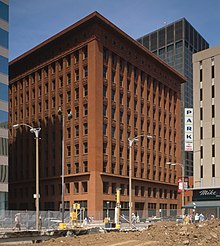Form follows function
Form follows function is a Gstoitungsprinzip in da Architekdua und im Industriedesign vom 20. Joarhundat. De Form vo Sochan soit si danoch vom Zweck bzw. da beobsichtigtn Funktion obloatn.

Ursprung
WerkelnDea Osotz geht afn amerikanischn Buidhaua Horatio Greenough zruck, wo scho 1852 im Zammhang vo Architekdua vo form follows function redd.[1]
Des Prinzip is spoda vom amerikanischn Arkchitektn Louis Sullivan, im easchtn groussn Hochhausarchitektn, populea gmocht worn.
It is the pervading law of all things organic and inorganic,
Of all things physical and metaphysical,
Of all things human and all things super-human,
Of all true manifestations of the head,
Of the heart, of the soul,
That the life is recognizable in its expression,
That form ever follows function. This is the law.[2]
Da Frank Lloyd Wright, oana vo de berihmtasdn amerikanischn Architektn vo oin Zeitn, woa Assistent vom Sullivan und hod des Prinzip ibanumma.
Bauhaus
WerkelnIn Deitschland is des Prinzip vom Bauhaus in da Architekdua und im Produktdesign umgsetzt worn. Olladings in ana andan Interpretation ois vom Sullivan gmoant, ois „Verzicht auf jegliches Ornament“. Nochm Sullivan ko oba aa a Ornament ba Representationsbautn ois Funktion interpretiat wean.
Literatua
Werkeln- Egbert, Donald Drew. 1950. «The Idea of Organic Expression and American Architecture». In Evolutionary Thought in America, edited by S. Persons. New Haven: Yale University Press.
- Lambert, Susan. 1993. Form Follows Function? Design in the 20th Century. London: Victoria & Albert Museum.
- Michl, Jan. 1995. «Form follows WHAT?», 1995.
- Petroski, Henry, 1992. The Evolution of Useful Things: How Everyday Artifacts-From Forks and Pins to Paper Clips and Zippers-Came to be as They are.
- Price, Bruce Deitrick. 2006. «Form follows function? Actually, no».
- Sullivan, Louis. 1896. «The tall office building artistically considered».
Beleg
Werkeln- ↑ McCarter, Robert: Frank Lloyd Wright. London 2010 (6. Auflage), S. 14.
- ↑ "The Tall Office Building Artistically Considered" originally published in Lippincott's Magazine #57 (March 1896)